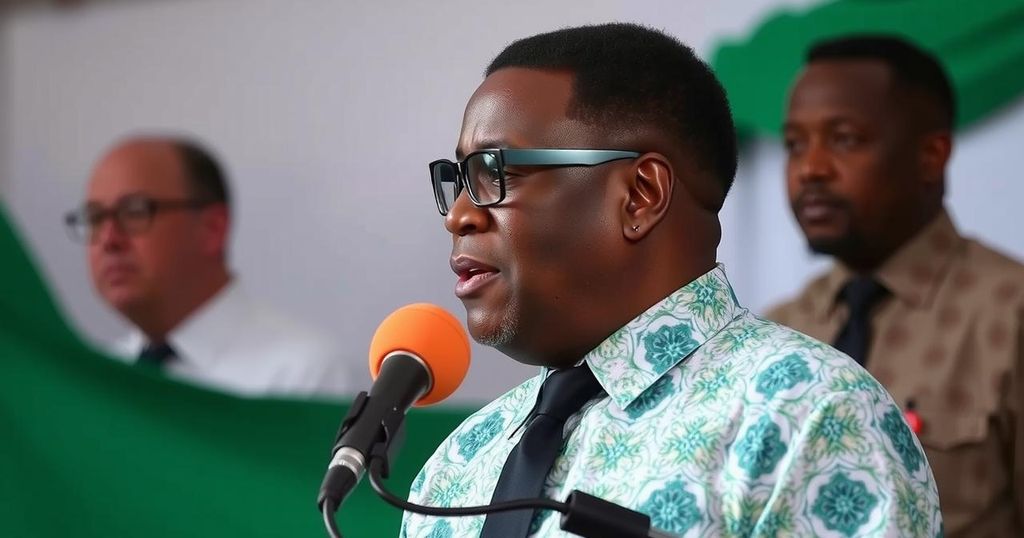Ghana’s December Elections: A Competitive Race Amid Economic Challenges

The upcoming December 7 elections in Ghana feature a competitive race between former President John Mahama and current Vice President Mahamudu Bawumia. Amidst economic recovery efforts from substantial debt and high inflation, voter sentiment indicates a desire for change from the traditional party setup. New candidates, notably independent Nana Kwame Bediako, appeal to the youth, but their impact is limited. Economic issues dominate the electoral discourse, shaping the election’s dynamics significantly.
Ghana’s upcoming election on December 7 presents a highly competitive landscape marked by former President John Mahama challenging the ruling party’s candidate, Mahamudu Bawumia. Mahama pledges to foster a 24-hour business climate to stimulate job growth and revitalize an economy grappling with a $30 billion external debt crisis. Meanwhile, Bawumia, the incumbent vice president, asserts his commitment to economic fortification amid post-pandemic challenges.
Historically, Ghana’s governance has pivoted between the National Democratic Congress and the New Patriotic Party since 1992, a trend likely to persist, according to Kwame Asah Asante, a senior lecturer at the University of Ghana. He noted that minor parties have consistently garnered less than 5% of the vote, although their performance could influence the possibility of a runoff election. In Accra, billboards featuring candidates reflect a palpable voter anticipation, with some citizens expressing a desire for change from the longstanding party duopoly.
Angela Ofori, an undecided voter, shared her frustration: “Since 1992 to this year, we haven’t changed parties…we want [to] change to [a] different party so that we would see more improvements.” As political discourse unfolds, new candidates such as independent runner Nana Kwame Bediako, who positions himself as a visionary with an environmentally conscious manifesto, attract young supporters, albeit with limited current electoral impact.
Ghana’s economy, a significant global cocoa producer, suffered a major setback with a debt default last year, exacerbated by post-COVID challenges and disruptions in grain supply linked to the Ukraine conflict. Voter sentiment is increasingly focused on economic performance, especially given high inflation rates and unrest following illegal mining activities threatening vital agricultural sectors. Asante emphasized that economic issues dominate voter concerns, which could drastically shift the election dynamics.
Individuals like Wisdom Gavor and Janet Bawah express a preference for Mahama’s policy ideas, citing the potential benefits of a 24-hour economy. Yet, support remains for Bawumia, recognized for policies enhancing digitization in various sectors, which have purportedly improved operational efficiencies in government and health services, as articulated by NPP supporter Ivan Duke.
Ultimately, Ghana’s electoral landscape reflects a stable democracy amid a complex array of socio-economic challenges. With both major parties and emerging candidates presenting distinct visions for the future, this election promises to be one of Ghana’s most competitive yet.
The political landscape in Ghana has historically been dominated by two major parties— the National Democratic Congress (NDC) and the New Patriotic Party (NPP)—since the return to democratic governance in 1992. The upcoming election on December 7, where the former president John Mahama challenges the current vice president Mahamudu Bawumia, is compounded by economic difficulties, highlighting issues such as a significant external debt and inflation that has touched record highs. The election dynamics are influenced by voter dissatisfaction with political continuity, leading to possible opportunities for emerging candidates.
The December 7 election in Ghana is poised to be a crucial test of the nation’s democratic stability, reflecting significant voter concerns over economic management and the desire for political change. With major candidates proposing divergent strategies to address pressing economic challenges, the outcome remains uncertain. The historical context of party dominance and the introduction of independent candidates further complicate the electoral landscape, indicating a potentially transformative moment in Ghana’s political history.
Original Source: www.voanews.com







